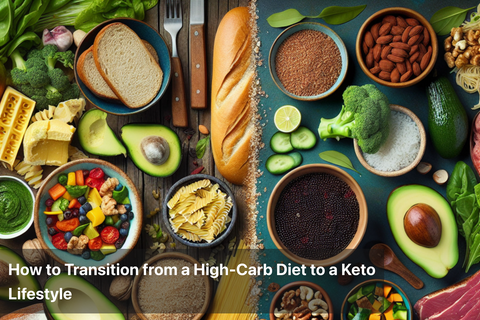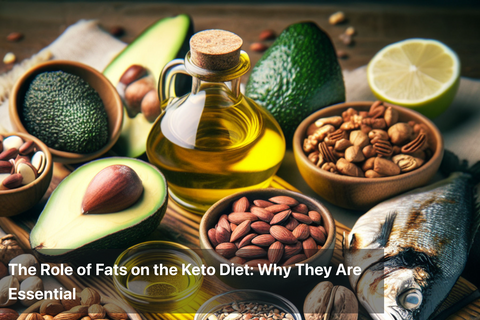
What are the keto flu symptoms?
Jumping on the keto diet bandwagon has blown up lately for its boasts of easier weight management and health improvements. This eating approach centers on slashing carbohydrates substantially, prompting your body into ketosis - when your system switches from burning carbs to torching fat for fuel instead.
Amidst all the hype around keto’s potential perks, it’s crucial to know about one common hiccup some encounter initially called the “keto flu.” It refers to symptoms that can crop up when first adapting to the ultra low-carb keto lifestyle. While not everyone deals with this phase, knowing what it entails can empower your keto startup.

Understanding the Keto Flu
-
Introduction: Keto flu is a set of symptoms that some people experience when they begin a ketogenic diet.
-
Transition Phase: It typically occurs during the initial phase of starting a ketogenic diet, as the body adapts from using carbohydrates for energy to using fats and ketones.
-
Duration: Symptoms of keto flu can last anywhere from a few days to a week or more, depending on individual metabolic differences and how the diet is managed.
-
Temporary Nature: Keto flu is typically temporary and should improve as the body adapts to using ketones efficiently for energy.
-
Individual Variation: Not everyone experiences keto flu, and its severity can vary widely among individuals.
-
Consultation: If symptoms persist or are severe, consulting a healthcare professional or registered dietitian familiar with ketogenic diets can provide personalized guidance and support.
Common Keto Flu Symptoms
The keto flu, while temporary, can bring about several noticeable symptoms as your body adapts to its new energy source. These symptoms, though not universal, may include:
-
Fatigue: Feeling more tired than usual is common during the initial phases of the ketogenic diet. This can be attributed to your body adjusting to burning fat instead of carbohydrates for energy.
-
Headaches: Some individuals may experience headaches as a result of the metabolic shift. Dehydration, another common occurrence during this phase, can contribute to this symptom.
-
Nausea: Feeling queasy is a potential side effect of the keto flu. It's essential to stay hydrated and ensure you're getting the necessary nutrients to ease this discomfort.
-
Dizziness: A temporary sense of dizziness or lightheadedness can occur. This is often related to changes in electrolyte levels, particularly sodium and potassium.
It's important to recognize that these symptoms are usually short-lived, typically lasting a few days to a couple of weeks. Every individual's experience is unique, and while some may not encounter any symptoms at all, others may feel the effects more prominently.
Staying well-hydrated, ensuring proper electrolyte intake, and allowing your body time to adapt can significantly ease these symptoms. Remember, as your body becomes accustomed to the ketogenic state, these initial challenges tend to subside, paving the way for the numerous benefits associated with this dietary approach.
Preventing and Alleviating Keto Flu
To prevent and alleviate keto flu symptoms, incorporating a few key practices can make the transition to a ketogenic diet smoother:
-
Gradual Transition: Rather than an abrupt shift, consider gradually reducing your carbohydrate intake over a few days. This allows your body to adapt more seamlessly to the change in energy sources, potentially minimizing the intensity of keto flu symptoms.
-
Hydration is Key: Staying well-hydrated is crucial during the ketogenic transition. Adequate water intake not only helps alleviate symptoms like headaches and nausea but also supports overall health. Aim for at least eight glasses of water daily, adjusting based on individual needs and activity levels.
-
Electrolyte Balance: Maintain proper electrolyte levels by incorporating foods rich in potassium, magnesium, and sodium into your diet. Avocados, leafy greens, and nuts are excellent sources. Consider using a pinch of salt in your meals to support sodium intake, especially during the initial phases of the diet.
-
Supplementation: In some cases, taking electrolyte supplements can be beneficial, particularly if you're experiencing persistent symptoms. However, it's advisable to consult with a healthcare professional before adding supplements to your routine.
By paying attention to these practical tips, you can significantly reduce the likelihood and impact of keto flu symptoms. Remember, the key is to support your body through this transitional phase, allowing it to adapt gradually to the ketogenic state. Each person's journey is unique, so listen to your body and make adjustments that suit your individual needs and comfort level. With mindful practices, the keto flu can be a manageable and temporary phase on your path to a healthier lifestyle.

Committing to the diet
Keto flu is common when first switching gears into fat-burning mode. The cough, fatigue, headaches and nausea are temporary growing pains as your body adapts from using carbs to ketones for fuel. As you push through the adjustment phase, remember those handy tips - ease into diet shifts gradually, stay hydrated, and keep electrolytes balanced. This can smooth the transition from running on carbs to revving on fat.
Every journey is unique too - some breeze through keto startup while others encounter more noticeable symptoms. If flu feelings persist or concern you, chatting with your healthcare provider is smart. They can offer tailored guidance based on your history and needs. The bright side? Once your body establishes ketosis, many report great surges in energy, mental clarity and weight control from staying keto-adapted. The temporary blahs pale in comparison to the potential gains this diet offers for health and lifestyle. Stick with the process, listen to your body, and this bumpy section will smooth out.
This Blog post is an initiative by Lo! Foods, to provide accurate and Nutritionist / Doctor approved information related to Health. Lo! Foods is India's leading brand for Everyday Functional Foods. Foods designed for specific Health conditions or Needs. Lo! Foods also runs India's largest range of Low Carb Healthy Cloud Kitchens, under the brand names of Lo!, ProteinChef, ATH (All Things Healthy) and DiabeSmart.













Leave a comment
Your email address will not be published.